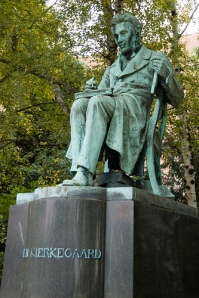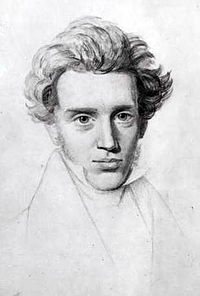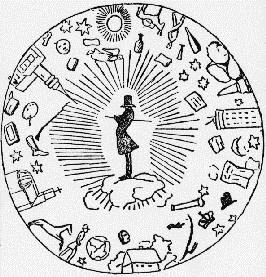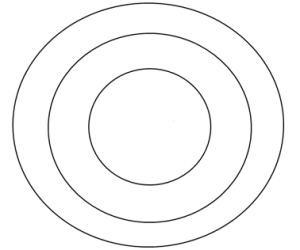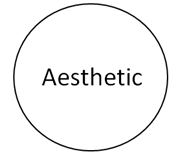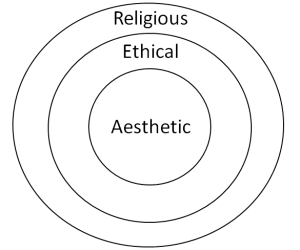KIERKEGAARD AND THE THREE WAYS TO LIVE
Who was Kierkegaard? Søren Kierkegaard was a Danish philosopher-theologian from the 19th century. Why should you care about him? He is credited with being something like the ‘grandfather’ of Existentialism, an important 20th century movement in continental philosophy, and he is very famous as both a philosopher and a theologian. I believe that increasingly as the 19th century is studied he will emerge as the most important theologian of that period. Of course, I might be biased, as Kierkegaard is actually the thinker that I do most of my research into, but I believe the statement is justified nonetheless. Here I will attempt to give a very brief sketch of Kierkegaard’s life and one of his most interesting ideas, that of the ‘three spheres of existence’.
Biographers of Kierkegaard often start by saying that his life was very boring and that not much happened during it, but then go on to describe it in intimate, fascinating and fascinated detail. Personally I find the life of Kierkegaard utterly absorbing, and I have a kind of morbid fascination with it, which is useful as I spend a lot of my time studying it… Kierkegaard was born in 1813 in Copenhagen, the Danish capital. There is a statue of him there today. Possibly the most notable feature of his early upbringing was that it was saturated with grief. Kierkegaard was the youngest of seven siblings, yet five of his brothers and sisters and his mother had all died by the time he was 25.
This can go some way to explaining why he might have been quite depressive and melancholic, as he is often characterised as being, but there are other ways. His father Michael was extremely religious and strict –a very wealthy self-made Copenhagen merchant, Michael may have believed that because he once bitterly blasphemed against God in his youth while tending sheep as an impoverished peasant he had brought a curse down on himself and his family, which was why so many of them died (from illness and accidents). Indeed there are indicators that Kierkegaard himself believed that he would not live beyond the age of 33 due to this curse, because this was the age that Christ died. He even checked the church record when he became 34 to make sure they had got his date of birth right.
From this background of grief and strict religiosity, Kierkegaard went to Copenhagen University as an undergraduate to study Philosophy and Theology. He struggled with faith and procrastinated lots, but eventually decided that he was a Christian, and took his Theology finals after 10 years, after his father had also died. He got there eventually! Around this time he had also met and fallen in love with a young woman called Regine Olsen, and they got engaged while Kierkegaard was writing his doctoral dissertation and considering becoming a vicar. So begins one of the great tragic love stories in world-literature. All seemed well. Then, one day, Kierkegaard broke off the engagement suddenly, sending a letter to Regine returning his ring. She fought this decision, but he would not go back to her. No-one really knows why Kierkegaard did this. There are all kinds of theories and speculative suggestions, but no-one really knows exactly what happens. Probably the safest things we can say are that the reason was connected to his melancholia and depression, and that he believed that if he got married and became a vicar he would not be able to write in the way that he wanted.
For write he did. He wrote about Regine. He wrote about love. He wrote about God. He wrote about Christ. He wrote about faith. He wrote about sin. He wrote about despair. He wrote about death. In about twelve years, Kierkegaard wrote some thirty-six works of philosophy, theology and literature. Many of them he published under pseudonyms, as was fashionable at the time, yet Kierkegaard did not just invent pseudonymous names but made his pseudonyms characters who spoke for themselves and interacted with one another in the works. Some of their names are: Victor Eremita (‘victorious hermit’), Johannes the Seducer, Johannes de Silentio, Johannes Climacus, Judge William, ‘A’, Vigilius Haufniensis (‘watchman of Copenhagen’), Constantin Constantinus, Nicolaus Notabene, Hilarius Bookbinder, Frater Taciturnus (‘quiet brother’), Quidam, Inter et Inter, H.H. and Anti-Climacus. He also published a number of writings under his own name, including a large number of Edifying Discourses that read a bit like sermons. Many of these works are philosophical and theological masterpieces.
There is some evidence that while writing all these books Kierkegaard might have thought at one point about reuniting with Regine, but she became engaged to another man called Fritz Schlegel and was soon married to him. This was not the only tragedy he experienced. About halfway through Kierkegaard’s authorship, a satirical newspaper called The Corsair picked on one of his pseudonymous books. Kierkegaard returned fire, publishing articles of his own by way of a reply. Unfortunately, the conflict escalated to the point where The Corsair began to mock Kierkegaard mercilessly for several months, including by publishing ridiculing cartoons about him, such as the one pictured above in which Kierkegaard is portrayed as believing that the entire Universe revolves around himself. This was a form of persecution, and through it Kierkegaard in some ways became even more depressed, and cut off from the world where before he had been able to walk around and converse in public quite freely and happily. However, the episode also seems to have sharpened him and pushed him to consider his own role and vocation even more seriously.
Towards the end of his short life, Kierkegaard changed his tack. Through his theological writings and his reading of the Bible, he became convinced that the Danish state church, the official religion of his home country, was actually so far removed from the Christianity depicted in the New Testament that it did not deserve to be called “Christianity”. Instead, he called it “Christendom” –a cultural, merely external, ritualistic phenomenon, with no effective bearing on existence, personal belief or the practice of daily life. Convinced in this view, Kierkegaard launched a one-man campaign against the Danish state church, going out onto the streets of Copenhagen and publishing pamphlets called The Moment in which he put forward his views and called people to return to radical, New Testament Christianity and leave the empty trappings of Christendom. They have been collected by some in English under the heading Attack upon Christendom. One day during this campaign Kierkegaard collapsed in the street, possibly from a lung infection (he had suffered from ill health for much of his life) and was taken to hospital, where he died. He was just 42.
That is a very brief sketch of Kierkegaard’s life. Here is just one idea from his vast philosophical-theological corpus, which I think is his most interesting and accessible idea, that of the ‘three spheres of existence’, which is most developed in the works Stages on Life’s Way and Concluding Unscientific Postscript. According to Kierkegaard, there are basically three spheres of existence in life, and though we all interact with all three, ultimately we all choose to allow just one of them to have the predominant influence on our lives. You could call them three ways to live. The three spheres are: the aesthetic, the ethical, and the religious. I will examine them each in turn.
The aesthetic sphere is the sphere of ‘immediacy’. It is characterised by the pursuit of immediate pleasure. In other words, people who live predominantly in the aesthetic sphere, aesthetes, are basically concerned with, and live for, their own pleasure and happiness. There are different forms of this. ‘Unsophisticated’ aesthetes will tend to pursue physical and bodily pleasures, like those offered by sex, drugs (e.g. alcohol) and rock’n’roll. ‘Sophisticated’ aesthetes are more interested in intellectual and mental pleasures, reflective and conceptual pleasures, to do with ideas, concepts, works of art, recollecting memories and so on. The problems with living mainly in the aesthetic sphere, according to Kierkegaard are twofold. Firstly, it leads to despair. Although aesthetes constantly pursue pleasure, they can never completely catch up with it and ultimately they find themselves existentially unsatisfied and in despair. This despair can also be unconscious, if the aesthete cannot realise they are in despair or that there is anything better avaialable.
The second, related problem with the aesthetic sphere is that it does not lead to a stable, unified self, and this is a problem that those who live predominantly in the ethical sphere try to address directly. The ethical sphere is the sphere of ‘requirement’. It is characterised by the attempt to live life according to moral requirement, doing unto others as you would have them do unto you. Those mainly in the ethical sphere, ethicists, try to create a unified self and a stable identity by living a consistent, moral life, as opposed to aesthetes who are borne along by their random whims and capricious desires. The problem with living predominantly in the ethical sphere, according to Kierkegaard, is that it doesn’t work. Try as we might to live by our own efforts in a consistently moral and ethical way, it is impossible to do, and we find ourselves dragged back down into the aesthetic by our love of our own pleasure, and so in practice it doesn’t lead to a unified self or a stable identity at all. According to Kierkegaard, in life most people will dance for the most part between these two spheres, occasionally trying to live morally and ethically where they feel a sense of duty and requirement, but ultimately living according to the prioritisation of their own pleasure.
The last sphere is the religious sphere. The religious sphere is the sphere of ‘ fulfillment’. The religious sphere is characterised by faith in and dependence on God. Those in the religious sphere, religious persons or, most completely, Christians, depend with inward passion on a power greater than themselves to live in an ethical and fulfilling way. Christians do this most completely by having faith in and depending on the absolute paradox of the God-Man, Jesus Christ, the inhabitation of the temporal by the eternal, who alone has the power to enable to us live consistently morally, and find real meaning and purpose and lasting joy as a unified self, though not without identifying with him in suffering. Very importantly, the truly religious does not stand off and apart from the aesthetic (remember we are all in all three spheres), but ‘reinhabits’ and ‘transfigures’ it, so that our love of pleasure is reorientated to its proper place, and indeed the religious finds new expression in the aesthetic realm, for example through spiritual works of art such as those composed by Kierkegaard. This is why it is important when drawing the three spheres diagrammatically to depict the religious as encompassing the ethical and the aesthetic.
So much for Kierkegaard’s life and one of his most interesting ideas. Some questions present themselves.
-Do you think Kierkegaard is right in his characterising of existence as essentially comprising of three spheres?
-Which sphere do you predominantly inhabit?
-Are you an aesthete? If so, are you really happy?
-Are you an ethicist? If so, is it working?
-Are you a religious person? If so, have you really submitted to Jesus Christ, or have you settled for merely a passionate inwardness or perhaps for ‘Christendom’ alone?
This article was adapted from a talk originally given to the Magdalen College School Theology Society, February 2013.
